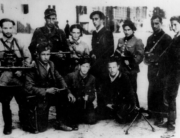
Miss India contestants in THE WORLD BEFORE HERE (Storyline Entertainment)
Socially conscious documentaries at the 2012 Tribeca Film Festival perceptively examined female roles and the culture wars, and brought well-deserved attention to unconventional heroes.
Nisha Pahuja’s The World Before Her, the festival’s Best Documentary Feature winner, adds considerable depth to the usual superficial contrasts of Indian women as either Bollywood stars or slumdogs. The beautiful contestants in the Miss India competition at first seem like manipulated Barbie dolls on an assembly line, but interviews gradually reveal individuals. The fundamentalist Hindus violently protesting against such beauty pageants run summer camps under their Durga Vahini women’s division, shown here on film for the first time, that militantly drill girls in conservative values and self-defense (some say aggression) against Western ideas. Interviews with enthusiastic participants bring out the contradictions for girls caught between the movement’s conflicting messages of empowerment and subservience to rigid patriarchy. (The documentary also provides corroborating factual context about women’s difficulties within modernizing India seen in Michael Winterbottom’s tragic romance Trishna.)
Sharing parallel themes with World, directors Jill Bauer and Ronna Gradus look at the impact of heightened sexualized pop culture in the U.S., particularly online, in Sexy Baby. In addition to jocular teen-boys-on-the-street interviews, three females are intensively followed. Two are annoying TV clichés; a young woman who seems like she’s trying out for an exhibitionist reality series and a precocious teen straight out of Gossip Girl’s Manhattan. However, the unique viewpoint of a former adult film star, known as Nakita Kash, is clear-eyed and insightful about the pressures of reality vs. fantasy. Christian Bonke and Andreas Koefoed’s Ballroom Dancer, the winner of a Special Jury Mention, subtly observes the distance between real and manufactured romance in sexy Latin dance competitions. Slavik, an aging but still ultra perfectionist Ukrainian Gypsy dancer, loses first one, then another, life/dance partner as he strives for a comeback championship.
The lines are dramatically drawn at the Texas State Board of Education in The Revisionaries. Director Scott Thurman is scrupulously fair in presenting (earnest) liberals and (personable) conservatives as three-dimensional people with passionate and fully thought-out opposing opinions about religious values in public schools. Board member elections and voting decisions set the standards for science and history textbooks in Texas, which heavily influence school district purchases throughout the country. Awarded another Special Jury Mention, this stimulating documentary feels like you’re watching the famous 1925 Scopes Trial, taking place, however, in the here and now.
Évocateur: The Morton Downey Jr. Movie is a fascinating look at how divisive political controversies were first stirred up as entertainment for television ratings in the late 1980s, decades before Glenn Beck. It tracks the surprising rise and precipitous fall of the son of a famous crooner who summered next to the Kennedys, interned in Teddy’s senate office, and wrote soul-baring songs and poetry. He then transformed into a fire breathing dragon of finger-pointing, right-wing, working-class discontent in a syndicated TV talk show, taped before a loud studio audience of rabid Jersey fans (that included directors Seth Kramer, Daniel A. Miller, and Jeremy Newberger). An astonishing sample of clips, including previously unseen footage from when the cameras kept running during commercials, not only demonstrate how Downey theatrically planned to push guests’ buttons, but display a now familiar panoply of pundits before they knew how to keep their cool on TV, including Pat Buchanan, Herman Cain, and Alan Dershowitz. Not among those willing to review this learning experience is the Rev. Al Sharpton, whose on-air accusations about a controversial police case brought notorious publicity at the expense of an innocent cop, who for the first time tells his side.
Booker’s Place: A Mississippi Story movingly delves into how TV’s treatment of political issues can have a lasting and unexpected impact on the people involved. Frank De Felitta’s NBC News report Mississippi: A Self-Portrait hadn’t been publicly seen since 1966 until his filmmaker son Raymond posted it online. That let Yvette Johnson finally see a legendary moment in her African-American family, when her grandfather Booker Wright astoundingly chose to voice on camera his frank testimony about being a waiter at a whites-only restaurant in Greenwood. Raymond and Yvette go back and interview whites and blacks (as well as the lively nonagenarian Frank) about the past, the consequences of the national spotlight, and the town’s uneasy adjustments to change. The community and the families ponder the resonance of editorial choices in making a documentary. Booker’s Place is also being shown at Tribeca on Demand, and NBC’s Dateline will revisit the footage later this month.
High Tech, Low Life salutes idealism in using modern media to promote political change, and is of immediate relevance with the Chinese government’s crackdown on activists. Director Stephen Maing tracked two citizen reporters, who find idiosyncratic ways around China’s Great Firewall to reach their online readership. To conduct unique reporting on community complaints, “Zola” uses humor and his youthful high spirits to deflect the serious images he posts on such issues as residential displacement, while “Tiger Temple” uses his travels on a bicycle as a cover for photographing the forgotten people in cities and polluted rural areas. Their optimism is as impressive as their determination.
The List spotlights an inspirational, noncombatant American war hero. Kirk Johnson idealistically left the Midwest to join American agencies reconstructing Iraq and Afghanistan, and then was shocked to discover that the indispensable local translators helping him and other Americans were, first, targeted for assassination (with their families), and then were stalled from fleeing to safety in the U.S. as refugees. He compiled their names into a (growing) list of cases and organizes legal assistance. Director Beth Murphy balances what comes close to an over-emphasis on a handsome, monastically driven, white savior by also following several Iraqis from their work in Baghdad’s Green Zone to temporary exile among other Iraqi refugees flooding neighboring countries. The world premiere was followed by a discussion on the status of asylum seekers and the posttraumatic stress they share with military veterans.
The single screening of Once Upon a Lullaby was enough to clear away cynicism or depression from any other documentary in this or any other festival. Subtitled The PS 22 Chorus Story, you may have seen the diverse Staten Island fifth graders’ videos on YouTube or their grand finale performance at the 2011 Academy Awards. Director Jonathan Kalafer, a public school teacher, emphasizes the educational focus and personal impact of exuberant chorus teacher Gregg Breinberg that warmly grounds the kids to be true to the love of music he joyously imparts.






Leave A Comment